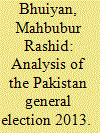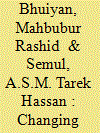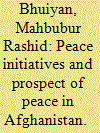|
|
|
Sort Order |
|
|
|
Items / Page
|
|
|
|
|
|
|
| Srl | Item |
| 1 |
ID:
127460


|
|
|
| 2 |
ID:
167800


|
|
|
|
|
| Summary/Abstract |
The nature and means of conducting warfare have always been changing. Technology, political realities and ideologies continue to play crucial role in this transformation as witnessed in the two world wars, the Cold War, and in following decades. Non-state actors became more visible and important. Nowadays, many wars involve such actors against state parties, for example, the US global war on terror, Israel-Hezbollah War (2006) and the current war against the Islamic State (ISIL). The term hybrid war involves a combination of traditional and nonconventional means, has become a common subject of discussion. But hybrid war is nothing new and has been practiced since ancient times. Several countries have now resorted to hybrid war: one such country is Russia, who has been blamed by western countries in this regard, e.g., in Georgian War (2008), Crimea (2014), ongoing conflict in eastern and south Ukraine, disinformation campaign against the West and interference in their governance process. Russia similarly, blames them for its destabilization by increased military presence on its borders and inciting revolutions in neighbour countries. Meanwhile, countries are developing hybrid warfare capacities, including plans for deploying military robots. Non-state actors now also use hybrid means like the Hezbollah or ISIL and several ongoing wars are becoming growingly hybrid; besides, the clash of ideologies, i.e., religious radicalism vs. white supremacism can create conflicts, indicating future wars may be even more so. Yet, some old mechanisms and strategies are likely to remain relevant and useful in future wars as well, suggesting their true ever-evolving and hybrid character.
|
|
|
|
|
|
|
|
|
|
|
|
|
|
|
|
| 3 |
ID:
133524


|
|
|
|
|
| Publication |
2014.
|
| Summary/Abstract |
After the 9/11 attacks, the US-led coalition launched the global War on Terror, invaded Afghanistan and ousted the Taliban from power. The Karzai government came into power in January 2002. Nevertheless, the war is going on even after twelve years. Peace remains unachievable in Afghanistan while the war has spilled over into neighbouring Pakistan, given rise to several militant groups, continues to create instability in bordering countries. To end this bloody war, various parties have undertaken peace initiatives with the Taliban but the initiatives are facing growing uncertainty for various reasons e.g. the nature of the proposed withdrawal of NATO forces by 2014 is not clear, parties lack consensus, prioritise their individual interests and viewpoints, attach various conditions and change positions before and during peace talks etc. Pakistan, despite being a crucial actor in the current war in Afghanistan, has been experiencing its own security problems and much troubled relations with both Afghanistan and the NATO since joining the war. These have been negatively impacting peace initiatives. The country also remains deeply suspicious about another regional power India's growing involvement in and relations with Afghanistan. Besides the Afghan Taliban and Pakistani Taliban (TTP), there are several other militant groups active in Afghanistan and Pakistan, such as the Haqqani Network or the Hizb-e-Islami of Gulbuddin Hekmatyar (HIG) who pose significant threats. But they are seldom invited in peace talks and similarly, their positions or perspectives on peace process are hardly ever addressed or taken into consideration. Meanwhile, the Karzai government's relations with the US-led coalition are also not working well; this is visible from the increasing disagreements and mistrust plaguing their mutual ties. Owing to these reasons, a long-lasting peace seems unattainable for Afghanistan in near future.
|
|
|
|
|
|
|
|
|
|
|
|
|
|
|
|
| 4 |
ID:
159614


|
|
|
|
|
| Summary/Abstract |
Russia, nowadays, vigorously displays its strength in global affairs, which it could not do after the fall of the Union of Soviet Socialist Republics (USSR). Vladimir Putin and Dmitry Medvedev made this possible by recovering the country’s former standing and equitable place in the world arena. The country’s reemergence has resulted in growing confrontations with the West. The Russo-Georgian War and the Ukraine Crisis deeply worsened Russia-West relations. There are other differences on, for instance, Syrian war, expansion of North Atlantic Treaty Organization (NATO) and Venezuela. The United States’ presidential election 2016 has also allegations of Russian meddling. Russia is now trying to form new alliances at regional and global levels, including expansion of relations with depressed Western allies to counterbalance Western preponderance. Albeit Russia and West both suffer from economic slump, their belligerent rhetoric and military postures go on where neither is willing to give up. Russian reassertion and Russia-West antagonism sometimes create fear of full-scale conflicts. This article examines the reemergence of post-USSR Russia under Putin and Medvedev, mutual perceptions of and interactions between Russia and the West, Russia’s role as a global player in recent times, and if Russia’s resurgence will create new conflicts. It is a qualitative research, drawing from secondary sources. It mainly argues that there are reasons both for and against conflict, but neither Russia nor the West can endure a real war.
|
|
|
|
|
|
|
|
|
|
|
|
|
|
|
|
| 5 |
ID:
108872


|
|
|
|
|
| Publication |
2011.
|
| Summary/Abstract |
Since the establishment of diplomatic relations, Bangladesh and China have developed robust bilateral cooperation based on mutual trust and interests. The most inspiring feature of Sino-Bangladesh relationship is its relative stability and continuity. Nevertheless, the trade deficit between the two countries has been a key concern for Bangladesh. From a different perspective, the Indian apprehension about the growing Sino-Bangladesh cooperation also worries Bangladesh. Bangladesh's efforts to promote relations with China are viewed by some Indians as unsettling for Indian interests in this region. Such apprehensions may put a kind of psychological pressure on Bangladesh to follow a cautious approach while dealing with China. This paper argues that both China and Bangladesh need to work together to implement various strategies to reduce the existing trade gap. It also argues that Bangladesh should not pursue any policy for promoting its friendly relations with India at the cost of its relations with China and vice versa. It is in this backdrop, this paper attempts to explore the existing Sino-Bangladesh bilateral relations, potential areas for further cooperation and also the Indian perceptions of the relations.
|
|
|
|
|
|
|
|
|
|
|
|
|
|
|
|
|
|
|
|
|